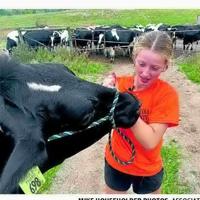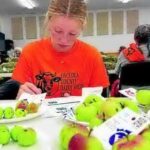EVART, Mich. — Alison Smith stared at the virtually empty dairy barn inside the Osceola County Fairgrounds, once bustling with teens and preteens preparing to show their prized animals but now eerily silent as an invisible virus once again interfered with a cherished summertime rite.
Smith, a 16-year-old from the Grand Rapids, Michigan, area, invested a significant amount of time over the past year preparing two heifers, Evergreen and Perfect, for competition at the fair.
But like hundreds of fairs nationwide, a bird flu outbreak now spreading among mammals forced significant changes — or outright cancellations — of the livestock contests that are a hallmark of summer fairs.
“Normally, we have a million cows in here,” Smith said. “And just a lot of people talking and having fun catching up in the dairy barn.”
States tightened restrictions on dairy cows amid the bird flu outbreak that spread to millions of poultry flocks nationwide and nearly 200 dairy herds across 13 U.S. states since March.
People are also reading…
More than a dozen farmworkers also were infected, though all experienced relatively mild symptoms. The risk to humans from the bird flu virus remains low, according to the federal Centers for Disease Control and Prevention.
The virus further strained businesses already battered by COVID-19 pandemic disruptions, leading to millions of dollars in losses and worker layoff s.
Michigan’s largest egg producer, Herbruck’s Poultry Ranch, laid off close to 400 employees following an outbreak of bird flu at its farms.
The outbreak also disrupted long-standing family traditions, such as those cherished by Smith, who has been exhibiting heifers, cows, pigs, and dairy steers at fairs for a decade.
In July, the CDC suggested fair exhibitors and organizers take steps to protect livestock and people, including limiting animals’ time at fairs and avoiding direct contact with animals when possible. That came on the heels of guidance from the U.S. Agriculture Department stressing testing and biosecurity measures.
Michigan has been among the hardest-hit states, with two farmworkers infected and 27 livestock herds affected.
The state ordered strict testing and public health measures, including banning the exhibition of lactating dairy cattle and those in the final two months of pregnancy until Michigan dairy cows have gone 60 consecutive days without new bird flu cases. All other cattle must test negative within seven days before being shown.
The restrictions didn’t outright ban dairy cattle shows at fairs, but some in the state opted to cancel the competitions, according to Kendra Van Order, the 4-H dairy science educator for Michigan State University Extension.
When Jacob Stieg, the Osceola 4-H coordinator, sent out an email detailing the state’s limits on showing lactating cattle at fairs, Smith’s reaction was, “Oh, my gosh. This is another year that I can’t show.” She wasn’t able to show in 2020, she noted, due to COVID-19.
“It’s kind of sad, really. I miss it a lot and all the memories we’ve made in this barn,” Smith added, pointing to the now-empty stall where her cow, Extraordinaire, was housed last year. She won the Supreme Grand Champion award a year ago at the fair northwest of Detroit.
Fairs in other states have made changes to try to lessen the chances of flu spreading among livestock, or to people.
In some states, including Iowa, Wisconsin, and Minnesota, lactating dairy cows are still allowed at fairs, but only if they have proof of negative flu tests in the week before they arrive.
The “Miracle of Birth Center” at the Minnesota State Fair excluded birthing cows and newborn calves from the popular exhibit as a precaution against bird flu. Iowa’s state fair canceled two attractions, a milking parlor, and an “I Milked a Cow” experience that let people interact with lactating cows.
Van Order, who coordinates with fairs through it.





